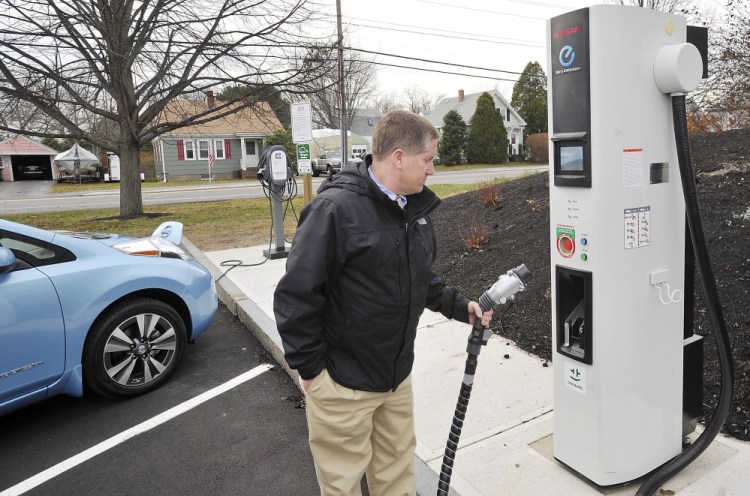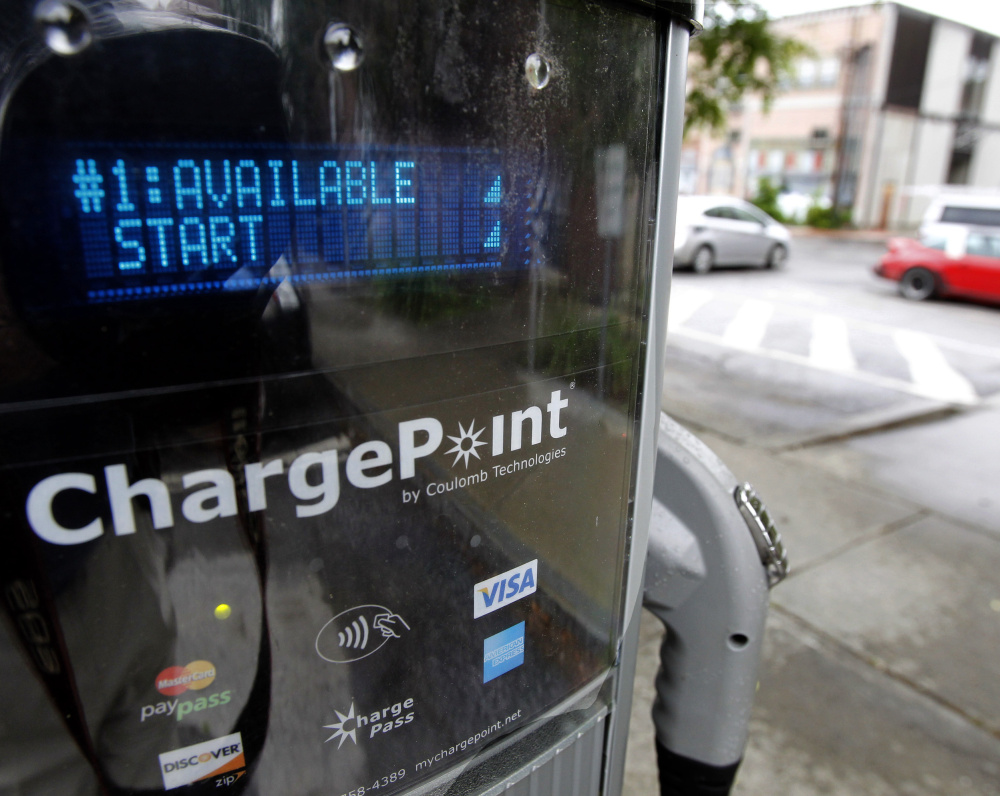Maine and Quebec announced a partnership Wednesday to expand electric vehicle charging stations between the state and the province.
A key goal is to accommodate tourism traffic from Quebec, where the government has begun a multimillion-dollar program to encourage residents to buy electric cars.
The announcement was made in Quebec City by Gov. Paul LePage and Quebec Premier Philippe Couillard.
The two leaders said state and provincial agencies will study how to create an electric vehicle corridor between Portland and Quebec, with a public-private partnership. They are expected to have an initial plan this summer.
Still to be finalized is how much the network would cost, who would pay for it and where the charging stations might be located. A high-speed charger can cost up to $40,000, according to Patrick Woodcock, the governor’s energy director. Woodcock said the state is meeting with car makers that offer electric vehicles, such as Nissan and BMW.
“The private sector is going to have to take the lead,” he said.
Any new network will face challenges. The major travel corridor from Quebec through rural Maine – Route 201 – has no charging stations from the international border to Waterville, a distance of roughly 100 miles. Woodcock said that route could need three or four stations.
Planners will have to develop a network of stations close enough to mitigate “range anxiety,” the fear of running out of power mid-trip. The equipment must also charge batteries fast enough to be convenient.
“I don’t think you can have slow chargers and do this project,” said Barry Woods, director of Electric Mobility NE, which promotes electric vehicle use in Maine. “You can’t sit for three or four hours in Jackman, Maine.”
Woods also is an organizer of Drive Electric Maine, an informal coalition that will work on the project.
In making the announcement, LePage stressed the importance of Maine’s tourism industry and the state’s historic ties to its Canadian neighbor.
“The history of the Quebec and Maine relationship is strong,” LePage said. “We must maintain our connectivity with modern transportation infrastructure. Electric vehicles have made significant progress and are coming to Maine. It’s vital we have a plan to make Maine open to this important technological change.”
The partnership complements a major effort by Quebec to put 100,000 electric vehicles on the road by 2020. The province currently has roughly 8,500 electric vehicles registered, half the total in all of Canada, according to Quebec’s transport ministry.
Quebec’s plan, which will cost $313 million in U.S. dollars, is called Propelling Quebec Forward with Electricity and provides rebates of up to $5,974 in U.S. dollars to buy electric or hybrid-electric cars. The province also is installing hundreds of charging stations.
One of the province’s priorities is to fight climate change, but it’s also a form of economic stimulus. Hydro-Quebec, the government-owned utility, is among the world’s largest hydroelectricity producers. Its vast network of dams and reservoirs helps power the province’s cities and a surplus is exported to New England and New York, earning billions of dollars.
Battery technology is improving at a rapid pace, allowing car makers to offer more electric vehicles. But today’s fleet of pure electric cars – those without small gasoline engines as a back-up – typically need to be charged after roughly 80 miles of driving. One exception are models made by Tesla that can go more than 250 miles.
Most owners charge up at home overnight. But on a trip, they look for charging stations.
Charging stations aren’t all the same, and any network will have to balance speed with cost. There are a number of considerations, Woods said.
The most basic charger is called Level 1 and works from a standard 120-volt, alternating current outlet. A Level 1 charger can take from eight to 17 hours to top off a typical vehicle’s batteries.
A Level 2 station can charge a typical vehicle in roughly three hours, but costs more to install.
The quickest unit, a DC fast charger, pumps direct current straight to the battery in less than 30 minutes, but the hardware alone can cost $20,000.
There’s no accurate tally of Level 1 wall chargers, Woods said. But Maine now has 47 Level 2 stations available to the public, according to estimates by Woods and tracking by plugshare.com, an interactive website that searches for charging stations. The state has 14 DC fast chargers, Woods said, including eight in Augusta that work only with Tesla vehicles.
Most of the state’s charging stations are in southern Maine, though only one is listed for Old Orchard Beach, a popular summer destination for Quebecois. It’s at the Ocean Walk Hotel.
The major route from Quebec to Maine is virgin territory. According to plugshare.com, a driver would have to go 100 miles on Route 201 to reach a charging station, from the Quebec border to Waterville, where there are the first of two public stations.
Overall traffic on that route also is limited. The average number of vehicles driving through Moscow in July was 3,268 per day, according to the Maine Department of Transportation.
Charging stations also are nearly nonexistent on Route 27, an alternate route from Quebec. The Sugarloaf Hotel in Carrabassett Valley has a Level 1 outlet and a Tesla Supercharger. Otherwise, it’s a 107-mile drive from the international border to Augusta, where there’s a Tesla Supercharger station and two Level 2 outlets.
LePage hasn’t always been excited about electric vehicles. In 2013, Maine declined to participate in a 15-state plan to promote zero-emission vehicles and install charging stations. At the time, a spokesperson for the Department of Environmental Protection said Maine lacked the resources to carry it out.
Battery-electric cars and plug-in vehicles that also have small gasoline engines account for less than 1 percent of the 46,011 new cars registered in Maine last year through September.
The governor’s interest in tourism and ties to Quebec may have tempered that view. Regardless of the reason, clean-energy groups welcomed the transition.
“We applaud the governor’s efforts to create more EV infrastructure,” said Ben Tettlebaum, a staff attorney at the Conservation Law Foundation in Portland. “It’s a step in the right direction.”
The venture also can help bring more charging stations to western Maine, allowing tourists with electric cars to venture far outside the Interstate 95 corridor, where most stations now are located. Chargers at tourist businesses that offer food and lodging could be a windfall, said Greg Dugal, executive director of the Maine Innkeepers Association. A DC fast charger, for instance, could top off a vehicle while its owner ate lunch.
“It would be an incredible draw to get people off the road,” he said.
Speaking specifically about the Quebec plan, Dugal said Canadians make up one of the largest single shares of Maine’s tourist traffic.
“If Canadians are moving to electric cars, we need to come up with a way to accommodate them.”
Tux Turkel can be contacted at 791-6462 or
tturkel@pressherald.com
Twitter@TuxTurkel
Send questions/comments to the editors.




